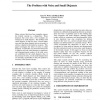Free Online Productivity Tools
i2Speak
i2Symbol
i2OCR
iTex2Img
iWeb2Print
iWeb2Shot
i2Type
iPdf2Split
iPdf2Merge
i2Bopomofo
i2Arabic
i2Style
i2Image
i2PDF
iLatex2Rtf
Sci2ools
115
click to vote
ICML
1998
IEEE
1998
IEEE
The Problem with Noise and Small Disjuncts
Many systems that learn from examples express the learned concept as a disjunction. Those disjuncts that cover only a few examples are referred to as small disjuncts. The problem with small disjuncts is that they have a much higher error rate than large disjuncts but are necessary to achieve a high level of predictive accuracy. This paper investigates the effect of noise on small disjuncts. In particular, we show that when noise is added to two real-world domains, a significant, and disproportionate number of the total errors are contributed by the small disjuncts; thus, in the presence of noise, it is the small disjuncts that are primarily responsible for the poor predictive accuracy of the learned concept.
Related Content
| Added | 24 Aug 2010 |
| Updated | 24 Aug 2010 |
| Type | Conference |
| Year | 1998 |
| Where | ICML |
| Authors | Gary M. Weiss, Haym Hirsh |
Comments (0)

